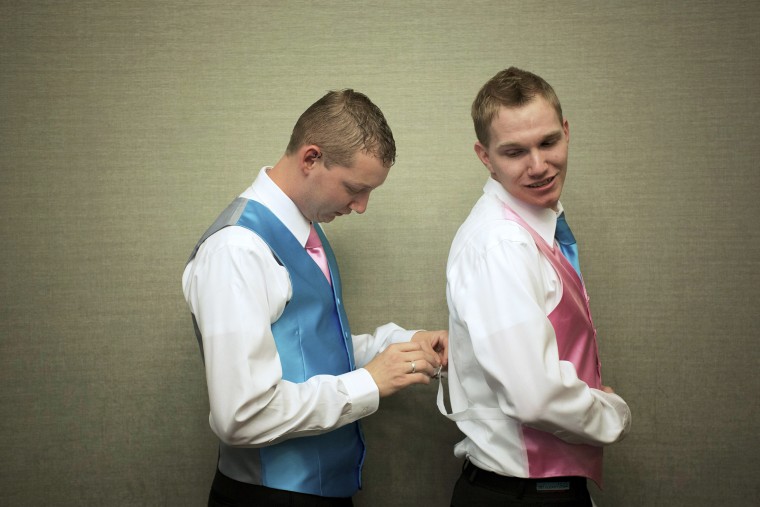Georgia is the latest state to consider legislation that could sanction discrimination in the name of religious freedom.
There are two versions of the Georgia bill -- a state House version, HB 1023, and a state Senate version, SB 377. Both would affirm the "right to act or refuse to act in a manner substantially motivated by a sincerely held religious tenet or belief whether or not the exercise is compulsory or a central part or requirement of the person's religious tenets or beliefs." Where those beliefs conflict with local, state or federal law, the government would have to prove that the law is meant to pursue a "a compelling governmental interest and is the least restrictive means of furthering that compelling governmental interest."
Georgia doesn't have a state law banning discrimination on the basis of sexual orientation, but some local jurisdictions--like the city of Atlanta--do have ordinances that LGBT rights activists fear could be swamped if this latest bill, similar to one approved by the state legislature in Arizona, is passed.
"The authors say 'we're not doing anything controversial,' but we don't believe that it's a coincidence that these bills are coming up soon after LGBT couples have been turned away from private businesses," said Chad Brock of the Georgia ACLU, referring to recent cases in New Mexico and Colorado, where businesses had refused to provide services to same-sex couples in violation of anti-discrimination laws. "We will oppose any efforts to use religion to justify discrimination in violation of local and federal civil rights laws."
Supporters of the legislation, which is moving rapidly through the Georgia legislature, have said that the bill is meant to protect religious freedom rather than discriminate. One of the authors of the state Senate version of the bill, Josh McKoon, sounded dulcet notes of religious pluralism in an interview with the Atlanta Journal-Constitution. Explaining what he had in mind, McKoon gave as an example, a "Sikh who wants to be able to work in food service wearing a turban, and a health inspector comes in and says, 'You can't do that.'"
But McKoon also said that "I do think this is another tool in the tool kit of those who are fighting on the Obamacare front --- Catholic health institutions who are being asked to provide abortion services, that sort of thing."
Critics say that this bill is part of a national pattern of "religious freedom" legislation sweeping conservative states aimed largely at allowing businesses and individuals refuse to provide services to gays and lesbians.
"What makes it so dangerous is that it's so broadly written, it's immeasurable in scope," said Michael Smith, a spokesperson for the Georgia Democratic Party. "Both of these bills could allow employers to discriminate against employees who enjoy protected legal status such as sexual orientation, pregnancy, sex, race, age, and even religion, all under the guise of protecting the employer's religious freedom." Smith called said the bill was "great for Republicans to take back to their [primary] opposition and tout as conservative street cred."
LGBT rights supporters swarmed a subcommittee hearing at the Georgia state legislature Monday afternoon--according to Smith and Brock, there were at least 100 people there to oppose the bill.
"There were so many people who showed up in yesterday's house subcommittee hearing," Smith said. "I think that on this particular bill, as long as everyone keeps up opposition like they have the last couple of days, if there is a chance that this bill passes, it is going to look completely different from its original form."
McKoon, one of the state senate sponsors of the bill, told a local television station in Atlanta that, "The only folks that have spoken against this legislation are people that want the government to be a tool to promote militant atheism."
Unlike in other states, where support for religious freedom bills has largely broken down along party lines, there were originally two Democratic sponsors of the House version of the bill, state Reps. Mack Jackson and Bob Bryant. Both Democrats have since withdrawn support for the bill.
"We were told they did not understand the exact content of the bill," said Smith of the Georgia Democratic party.
The Georgia legislative session is expected to last until March. The speed at which it is moving through the legislature Brock says, suggests that the bills have the support of the leadership in both the state House and Senate, and might pass absent the kind of opposition that killed similar legislation in other states.
"When a bill is moving this fast, it certainly has the support of the leadership," Brock said.
